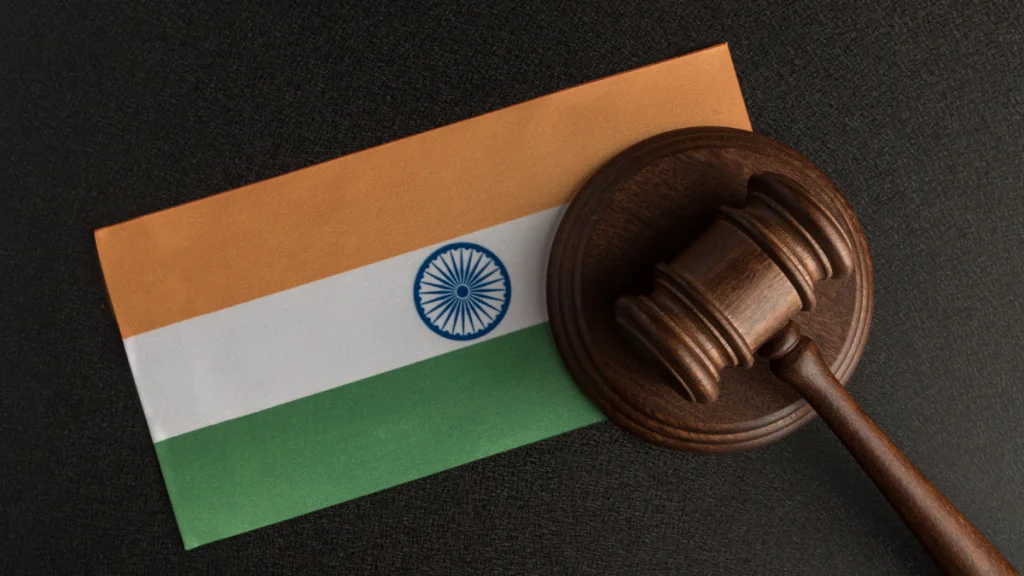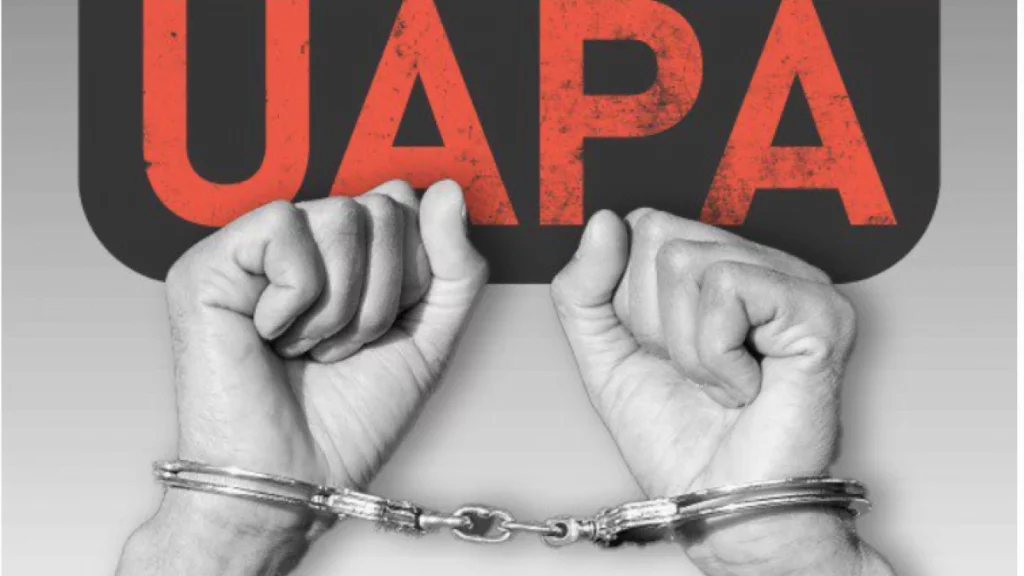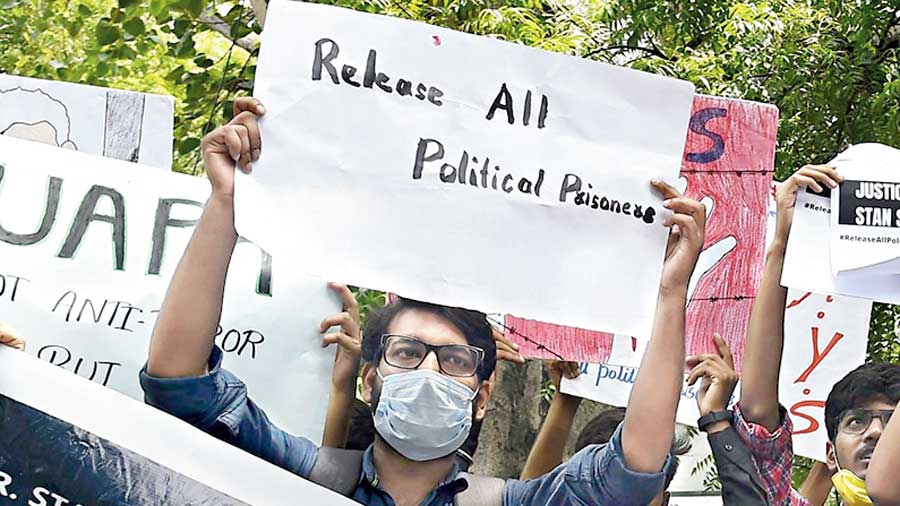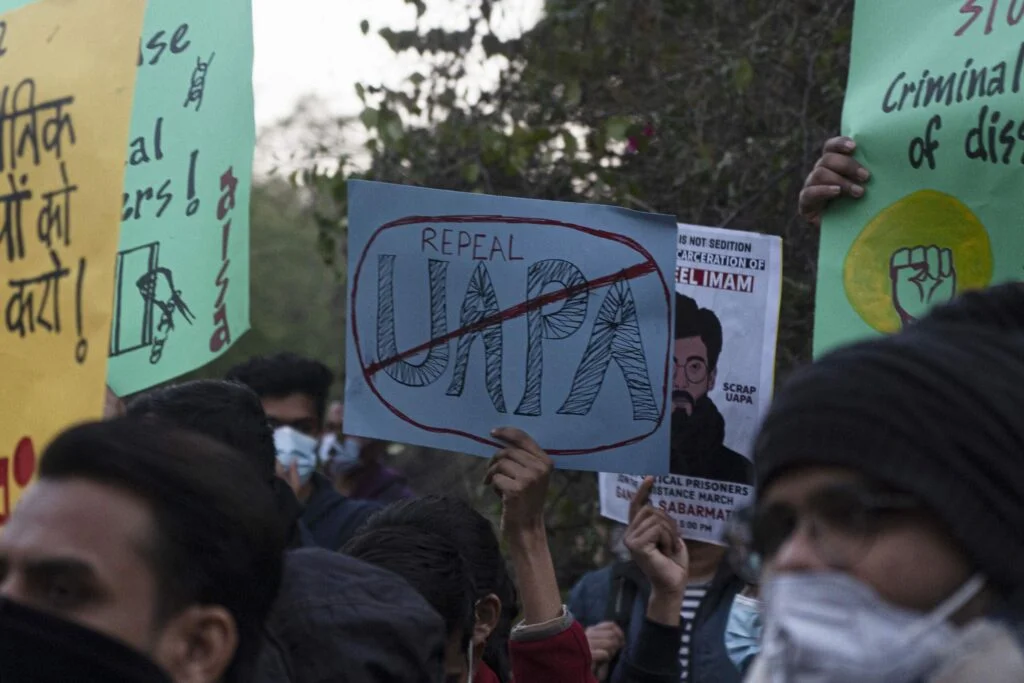Diverging from its bleak past of recent years, the Supreme Court on August 13th declared that the ‘bail is rule‘ even in terror related cases under the draconian law of UAPA. The bench comprising Justice A S Oka and A G Masih granted bail to a petitioner accused under the repressive anti-terror law, stating, ‘the allegations of the prosecution may be very serious. But the duty of the courts is to consider the case for grant of bail in accordance with the law. ‘Bail is the rule and jail is an exception’ is a settled law.’
Diverging from its bleak past of recent years, the Supreme Court on August 13th declared that the ‘bail is rule‘ even in terror related cases under the draconian law of UAPA.
The judgement may open the door for an effective restraint on the misuse of harsh UAPA provisions. In the past, the Supreme Court has been ambiguous on bail applications in UAPA cases which encouraged its punitive application in absence of a clear guiding principle regarding bail. Earlier, in another blow to the government’s attempts of cracking down on independent journalism, the Court in May 2024 has deemed the arrest of NewsClick founder Prabir Purkayastha unlawful and illegal.
These verdicts may broaden the scope of judicial scrutiny in UAPA cases as many civil rights groups has been demanding for years. The draconian law stands hollow in the light of constitutional framework. The law lacks an impartial setup and gives absolute power to the government in labelling a group as ‘terrorist group‘ and limits the judicial review of such decisions.
The law infringes upon the free speech and can be employed to single out journalists and protesters who criticise the government which was evident in the flurry of terror cases levelled against the CAA-NRC protesters. Disregarding the very foundations of a modern jurisprudence, the law is based on the presumption of guilt of the accused and makes the jail as the rule.
UAPA: A failed law with damaging consequences
The canons of criminal jurisprudence in India have their foundation in the Fundamental Rights enshrined in the Constitution. Detention on the mere accusations compromises the Right to Life and Liberty under Article 21. Since the main purpose of detention is to ensure availability of an accused for the trial, if the availability is ensured, the detention does not remain required. Therefore, the legal edifice mandates that the courts while interpreting the provisions of various criminal laws must avoid detention unless it seems indispensable.
Now the court has weighed in on this principle: ‘refusing bail to a deserving applicant merely on the grounds that offense is under the draconian UAPA would be a violation of the accused’s fundamental right to life and due procedure.‘ This Supreme Court ruling has set a precedent ensuring that people accused under UAPA provisions might be granted bail. The legal principle of bail as the norm was originally laid down in the historic Supreme Court case of state of Rajasthan V. Balchand in 1978.
The modern criminal justice system is not punitive in nature and aims to rehabilitate the offender and prevent the repetition of crime, facilitating impartial justice for both the accused and the victim. Based on this premise, modern legal edifice considers the bail to be the rule and jail is a mechanism designed for the exceptional situations. All legal doctrines in modern times have reinforced this fundamental principle time and again including the highest court of our country.
The modern criminal justice system is not punitive in nature and aims to rehabilitate the offender and prevent the repetition of crime, facilitating impartial justice for both the accused and the victim.
However, Indian courts seem to have forgotten this core tenet of legal edifice in recent years as various judges sat over the bail pleas of numerous political activists who were thrown into jail. Their incarcerations under UAPA have been done almost in a conspiratorial manner with an intentional delay in trials to make sure their prison time is long.
A vindictive regime weaponising law against civil society
In a vindictive display of brute power, a spate of cases was rain stormed against numerous public figures in Delhi Riots in 2020 by the Delhi police. The partial and politicised exercise became a complete mockery of the independence of law when BJP leader Kapil Mishra, caught on camera inciting violence, was not even named in the Police FIR.
Fabricated allegations of ‘premeditating conspiracy behind the riots‘ in cases of Pinjra Tod activists Natasha and Devangana followed the similar trajectory where a punitive regime is adamant on punishing the voices of dissent. A steep rise in use of stringent provisions of UAPA tells the same story: 5,023 cases were lodged in just a span of 4 years between 2018 to 2022.
Under this draconian law 8,947 people were arrested in the same period. The number of UAPA cases jumped from 814 in the year 2021 to 1,005 in 2022. Later, out of those charged under these provisions, 550 were acquitted as no evidence was found. In a latest addition to this ongoing reprisal, the Delhi LG gave his nod for the prosecution of novelist Arundhati Roy under UAPA for her alleged comments in 2010 in favour of Kashmiri separatism.
Onslaught on independent journalism
This weaponisation of this law is possible due to the fact that the UAPA is designed to keep an accused behind bars for indefinite times and its provisions makes the granting of bail nearly impossible. Since Narendra Modi took oath of office in 2014 a sheer number of these terror cases target the political opponents, journalists, academics, and members of civil society. A reporter for Kashmir Narrator Aasif Sultan reunited with his family after five years of imprisonment under UAPA in February 2023, only to be re-arrested few days later. His ordeal is a testimony how the terror legislation is being used in persecuting journalists in Kashmir.
Jammu and Kashmir tops the UAPA cases with total 371 cases lodged in 2022.
Jammu and Kashmir tops the UAPA cases with total 371 cases lodged in 2022. A total contempt for due process and a fair trial has been seen in case of Umar Khalid with a pre designed effort to keep Khalid in prison under the provisions of UAPA. This outspoken opponent of the current government still awaits his trial after being in jail for nearly 4 years. His bail plea was rejected by the Delhi High court in October 2022 as court saw the accusations to be true at face value.
After 8 months of bail plea hearing, the court had weighed in favour of the prosecution who had relied heavily on a WhatsApp group chat. In another case of dubious application of this law, the Delhi Police had arrested NewsClick Founder Prabir Purkayastha last October under various sections of UAPA. A Supreme court bench in May 2024 found his arrest illegal and directed his immediate release from jail.
In a discussion held in the wake of Purkayastha’s release after Supreme Court verdict, ‘UAPA in Delhi: Punishment without Trial‘, senior Supreme court lawyer, Colin Gonsalves said ‘We are at a very tenuous period of our history, a very dangerous period.‘ Gonsalves went on describing the number of cases where the agencies could not find any corroborative evidence and the individuals were eventually released after an unlawful detention. These individuals included Gautam Navlakha, Vernon Gonsalves, G N Saibaba, Kishorchandra Wangkhem. Gonsalves deems the courts responsible for failing in their core function of defending the civil liberties.
The courts set the precedents which only facilitated this vindictive attack on individual freedom. Our judiciary functions under intense political pressure and some judges have politicised motivations in their rulings, he claims.
The draconian law of UAPA is rooted in a colonial mindset with a troubling history of infringing upon the fundamental rights of speech, life and liberty. There is an immediate need to define the ‘unlawful activities‘ and ‘terror acts‘ under the act. The setup of an independent body in matters related to terror activities which should take away the absolute powers of the government is of utmost necessity. The scope of judicial review needs to be broadened ensuring the strict and impartial oversight while making the investigating agencies liable in cases of political vendetta.
Legal experts and civil rights activists have for long raised the concerns over the penalising nature of UAPA and outlined serious flaws in its application. They have sought the repeal of this tyrannical law intended to bypass the constitutional restraints. The question remains that should there be a place for such vindictive laws in a liberal democracy like India?
UAPA is completely antithetical to the spirit of our constitution and violates every single constitutional principle enshrined in our constitution. The recent decisions of the highest court should move us in direction of putting a full stop to the arbitrary arrests of citizens and lead us towards the restoration of fundamental rights and a judicial environment which defends the civil liberties.






